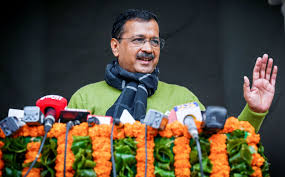Delhi Election 2025: BJP Adopts Arvind Kejriwal’s Model of Free Schemes Before Assembly Polls
By Lokmat English Desk | Updated: January 8, 2025 11:26 IST2025-01-08T11:24:40+5:302025-01-08T11:26:11+5:30
The BJP, which once criticized Arvind Kejriwal's free electricity and water schemes as “Revdi Culture,” has now promised similar ...

Delhi Election 2025: BJP Adopts Arvind Kejriwal’s Model of Free Schemes Before Assembly Polls
The BJP, which once criticized Arvind Kejriwal's free electricity and water schemes as “Revdi Culture,” has now promised similar benefits just a month ahead of elections. This dramatic shift raises a pertinent question: Why is the BJP, which once opposed the "politics of freebies," now emulating Kejriwal’s governance model?
The BJP had earlier criticized Arvind Kejriwal's free electricity and water schemes as “Revdi Culture,” dismissing them as unsustainable populist measures. However, with elections just a month away, the party has been compelled to make similar promises. This raises a critical question: why is the BJP, which once opposed the "politics of freebies," now attempting to adopt Kejriwal's model?
Also Read: Delhi Election 2025: AAP Supremo Releases 'Phir Layenge Kejriwal' Campaign Song (Watch Video)
Electricity: Delhi vs. BJP-ruled States
In Delhi, the Kejriwal government offers electricity bills ranging from ₹700 to ₹935 for consumption up to 400 units, the lowest in the country. In contrast, BJP-ruled states charge significantly higher rates. For the same 400 units, Haryana residents pay ₹2,335, more than double Delhi's rates. Uttar Pradesh charges ₹2,956, four times more than Delhi. Meanwhile, Madhya Pradesh residents pay ₹3,854, and in Maharashtra, the bill soars to ₹4,463.
Water: AAP Model vs. BJP-ruled States
The AAP government in Delhi provides 20,000 liters of free water per household every month. Beyond this limit, only a nominal fee of ₹2 per 1,000 liters is charged. BJP-ruled states, on the other hand, offer no free water and impose higher rates. For instance, Maharashtra charges between ₹5.22 and ₹15.44 per 1,000 liters. Residents in Madhya Pradesh and Gujarat pay around ₹100 for 15,000–20,000 liters of water per month.
Financial Assistance for Women
Under Delhi’s “Mukhyamantri Mahila Samman Yojana,” women receive ₹2,100 monthly, the highest in the country. In comparison, Madhya Pradesh provides ₹1,250 under the “Ladli Behna Yojana,” ₹850 less than Delhi. Maharashtra offers ₹1,500, and Assam ₹1,250, both falling short of Delhi’s provisions.
BJP’s U-Turn on “Revdi Culture”
In 2022, Prime Minister Narendra Modi criticized free schemes as “Revdi Culture,” calling them detrimental to the nation’s development. Yet, ahead of the elections, the BJP is now promising similar benefits in Delhi. This shift prompts questions: If the BJP endorses free electricity and water in Delhi, why hasn’t it implemented these measures in other states under its governance? While Delhi residents enjoy a ₹935 electricity bill for 400 units, BJP-ruled states charge as high as ₹3,854. Similarly, Delhi households receive 20,000 liters of free water monthly, a benefit unavailable in BJP-governed states.
Key Questions for the BJP
If the BJP supports free schemes in Delhi, why hasn’t it implemented them in its own states?
Why are basic amenities like electricity and water far more expensive in BJP-ruled states compared to Delhi?
Kejriwal’s governance model, focused on public welfare, has pressured the BJP into adopting similar measures. The very party that once opposed “Revdi Culture” now appears to recognize its appeal, proving that Kejriwal’s approach has become a benchmark in electoral politics.
The Election Commission of India announced the much-awaited Delhi Assembly Election dates, which are scheduled to take place on February 5, 2025, and results will be declared on February 8, 2025. The Delhi election is expected to witness a three-way fight between the ruling Arvind Kejriwal-led Aam Aadmi Party (AAP), Bhartiya Janata Party (BJP,) and the Congress party.
Open in app